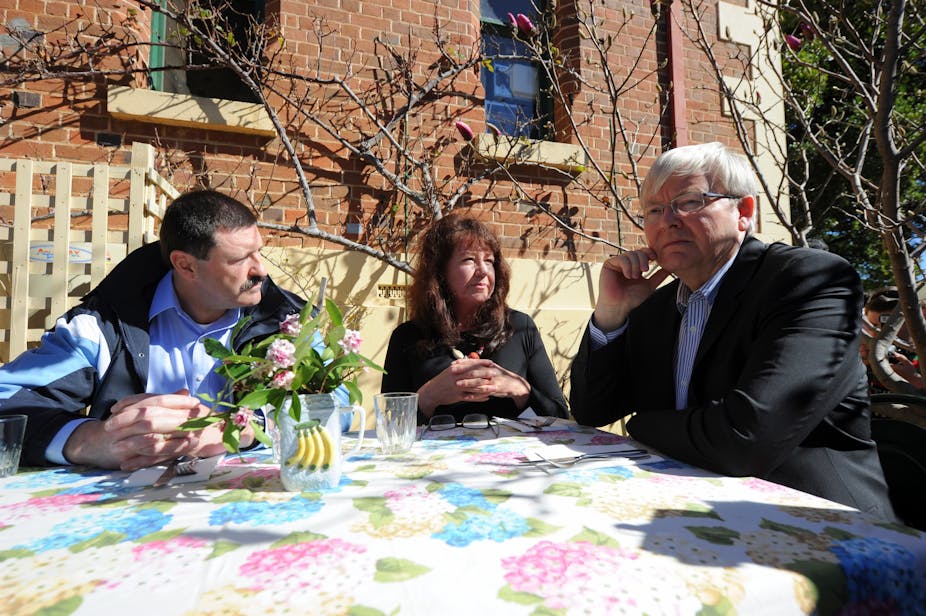One week out from the federal election and the park in the centre of Braidwood is a hive of activity. The annual Daffodil Fair is in full swing. The extent to which this small town and its region reflect the electorate, and potentially the nation, is significant.
In 2010 the polling place at Braidwood Central School recorded 1,314 votes. On a two candidate preferred basis, the result was 53.39% to Labor’s Mike Kelly, slightly increasing his majority against the national trend away from Labor. In 2007, Braidwood’s 1,313 voters gave Kelly 52.92% of the two-candidate preferred. In 2004, the last election won by the Howard government, Braidwood gave the incumbent, Gary Nairn, 53.53%. Braidwood voters closely mirror the trend of the electorate as a whole: the bellwether of the bellwether.
Braidwood, at the northern end of the electorate of Eden-Monaro has a colourful gold rush history but is perhaps better known now as the pitstop between Canberra and the New South Wales south coast. The surrounding region includes the villages and localities of Araluen, Nerriga, Mongarlowe, Majors Creek and Fox’s Elbow.
The town itself has a population of around 1,200, two pubs, a weekly newspaper and a Driver-Reviver stop, which, on Saturday morning, is busy handing out cups of tea and coffee and selling softdrinks. The historic main street, Wallace Street, which has been the backdrop for several Australian movies, is busy with both vehicular and pedestrian traffic.
There are a couple of empty shops on the main street of Braidwood but generally speaking, business is brisk and picking up as the warmer weather brings more people coming through town en route to the coast.
A recent visitor from Sydney looking to buy commercial property in the town, after quizzing a local businessperson regarding property prices and business opportunities, commented that Braidwood did not appear as “upmarket” as he had expected. He was given short shrift. That sort of comment does not go down well in a Heritage-listed town.
Along Wallace Street a poster of Mike Kelly, gazes down from the window of a flat above a craft shop. There are another two of Kelly’s posters affixed to telegraph poles at the Canberra end of town. In a sunny shop courtyard where the Kings Highway turns to the left towards the coast, a poster stating “Gonski: our kids are worth it” is tied to a tree facing the road. Those are the only election posters in evidence anywhere in town, and other than those three there is no indication anywhere that a federal election is only a week away.
The Deputy Mayor of Palerang Council, Cr Paul Cockram, runs a desktop publishing business in town. He says he’s sick of this election and believes that this will be the year the bellwether status is broken. While predicting a 14-seat majority to the Coalition, he says he believes Kelly will hold Eden-Monaro.
“Hendy’s been pretty unimpressive”, is his blunt assessment. Cockram singles out the NBN as the issue most pertinent to the town, but comments that people out of town will still be stuck with slow internet connections for years.
At the Visitors’ Information Centre, one of the volunteers says she hasn’t really been aware of any talk of politics or the election in town but she feels that people don’t like either Liberal or Labor: “It’s all about money and politics and power, and little towns like this get forgotten.” She says she admires Greens candidate, Catherine Moore’s energy and dedication in pursuing the issues the other parties overlook and believes she will do well in Braidwood.
The owner of the local bookshop is unequivocal: he will be voting Green and giving his second preference to Kelly. Like Cockram, he sees the NBN as a significant issue, as well as strong action on climate change.
“It’s not a matter of voting for Rudd or Abbott, it’s a matter of who will best serve the interests of small towns, and the interests of small towns is a sustainable environment and fast internet to help small business.”
Down the road outside the bakery a member of the local ALP branch is happy to talk about the negative media coverage of the campaign and the apparent Murdoch bias towards the Coalition.
Meanwhile, back at the Daffodil Fair, there is not a political candidate or party worker in sight. At the monthly market the week before, party workers for both major candidates were in evidence, but with only a week to go, there is no sign of anyone wearing a party t-shirt, no posters, no election material. In a town where the local vote so closely mirrors that of this very large, diverse and crucial electorate, the lack of politics so close to an election is surprising.
Greens candidate, Catherine Moore, is in town, but not actively campaigning. Moore is a long-time local, living just out of town, and Braidwood is a strong support base for Greens in Eden-Monaro. In 2010 Moore polled 9.72% overall in Eden-Monaro, but 16.44% at the Braidwood polling booth.
The general mood in Braidwood is not one of change, but of political resignation. Disillusionment with both leaders and a feeling that small communities are being overlooked by the media circus that is following a lacklustre and increasingly presidential campaign have contributed to a disengagement from politics.
If Braidwood follows its usual trend as the canary in the mine of Eden-Monaro, and the national polling is right, Kelly will hold his seat with Greens preferences, but the electorate will be held by an opposition party for the first time in 40 years.

